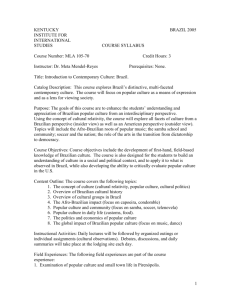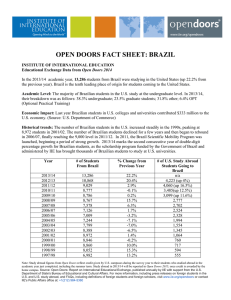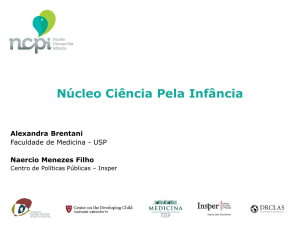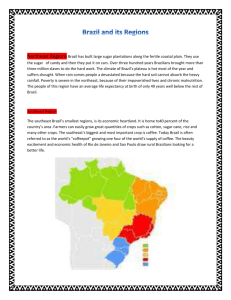Apollo International Builds on a Local Network to Create Colleges in
advertisement
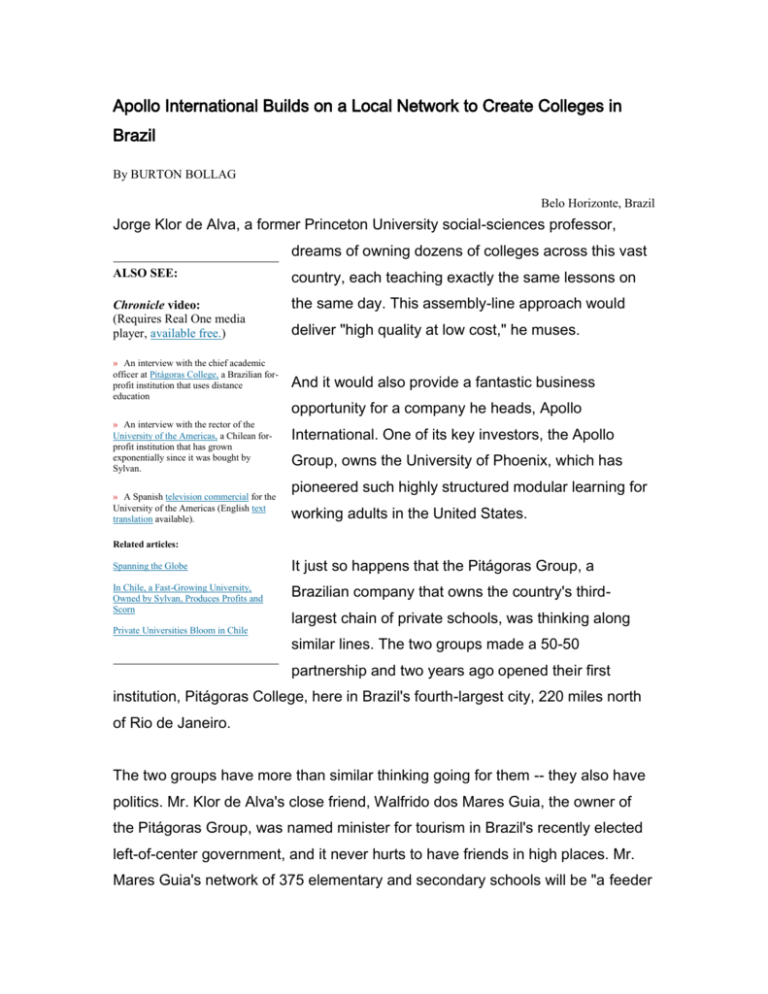
Apollo International Builds on a Local Network to Create Colleges in Brazil By BURTON BOLLAG Belo Horizonte, Brazil Jorge Klor de Alva, a former Princeton University social-sciences professor, dreams of owning dozens of colleges across this vast ALSO SEE: Chronicle video: (Requires Real One media player, available free.) » An interview with the chief academic officer at Pitágoras College, a Brazilian forprofit institution that uses distance education » An interview with the rector of the University of the Americas, a Chilean forprofit institution that has grown exponentially since it was bought by Sylvan. » A Spanish television commercial for the University of the Americas (English text translation available). country, each teaching exactly the same lessons on the same day. This assembly-line approach would deliver "high quality at low cost," he muses. And it would also provide a fantastic business opportunity for a company he heads, Apollo International. One of its key investors, the Apollo Group, owns the University of Phoenix, which has pioneered such highly structured modular learning for working adults in the United States. Related articles: Spanning the Globe In Chile, a Fast-Growing University, Owned by Sylvan, Produces Profits and Scorn Private Universities Bloom in Chile It just so happens that the Pitágoras Group, a Brazilian company that owns the country's thirdlargest chain of private schools, was thinking along similar lines. The two groups made a 50-50 partnership and two years ago opened their first institution, Pitágoras College, here in Brazil's fourth-largest city, 220 miles north of Rio de Janeiro. The two groups have more than similar thinking going for them -- they also have politics. Mr. Klor de Alva's close friend, Walfrido dos Mares Guia, the owner of the Pitágoras Group, was named minister for tourism in Brazil's recently elected left-of-center government, and it never hurts to have friends in high places. Mr. Mares Guia's network of 375 elementary and secondary schools will be "a feeder system and a platform" for expansion across Brazil of a future network of Pitágoras colleges, says Mr. Klor de Alva. In the first college's newly renovated seven-story building on a pleasant downtown street here, classes tend to have about 50 students, and are taught with standardized PowerPoint presentations projected onto a screen at the front of the classroom. The lessons are available online so students can review them at any time. In other rooms, students sit in groups of five, discussing problems or doing other group assignments. Ready for the Job Market Amaryllis Nogueira Santos, a first-year student of business administration, says she likes Pitágoras's hands-on education, including the simulations of real-world business situations. "This method is better," she says. "At the other universities in Brazil, they just give you theory." As it nears the end of its second academic year, Pitágoras has 1,100 students enrolled here and a total of 200 more at two newer branches in the cities of Curitiba and Ipatinga. Two-thirds of the students are working young adults -- with an average age of 24 -- enrolled in evening classes. The rest of the classes meet in the mornings. Although not classified as a university, since it conducts no research and has no graduate studies, Pitágoras offers the basic Brazilian four-year undergraduate diploma (which, in reality, often takes Brazilian students six or seven years to complete). The thrust of Pitágoras's mission is to make graduates employable. This is reflected in the choice of its career-oriented disciplines. Only two are currently offered: business administration and industrial engineering. Law, typically an undergraduate program in Brazil, is set to start in August. Six new disciplines are awaiting authorization from the education authorities: communications, nursing, occupational therapy, physical therapy, psychology, and tourism. Skills useful for working life, like teamwork and communication, are stressed. Two-fifths of students' time is spent in the classroom, two-fifths working in teams, and one-fifth on exams and student presentations. Students must make regular PowerPoint presentations in class, English and Spanish classes are mandatory -reflecting the dominant languages of international business -- and students learn how to prepare a résumé and go to job interviews. "Students leave here well prepared to face the market," says Aécio Lira, the academic vice president. Standard Curriculum The institution contracts with leading experts in their fields to create courses, says Claudio de Moura Castro, Pitágoras's chief academic adviser. He left a job as chief educational adviser to the Inter-American Development Bank, in Washington, to develop Pitágoras's academic program. "We tell them, whatever else, it must consist of 10 units [there are 10 weeks to a term], and each unit must have an introduction explaining what is important, information on how students will be evaluated, and suggestions for practical work." Handbooks are then printed -- one for teachers and one for students. Teachers, most employed part time, are trained in how to teach the lessons. With the curriculum already worked out in detail, faculty members needn't be highly specialized themselves. Low-Quality Market This may sound a lot like high school. But Simon Schwartzman, a former professor of political science at the prestigious State University of São Paulo who now works at the Institute of Labor and Society, an independent think tank in Rio de Janeiro, says Pitágoras is not a bad alternative to the often very low quality of private higher education in Brazil. "You're talking about [young] people who don't want an academic career, but who want to improve their skills," says Mr. Schwartzman, who is a member of a Pitágoras advisory committee that meets once a year. "It could be a good model for that segment" of the student population. In its promotional material, Pitágoras stresses that it uses the teaching methodology developed by the University of Phoenix. It has adopted Phoenix's marketing strategy as well: organizing recruitment activities on the premises of willing local companies. There is a significant difference in educational philosophy, though. Phoenix caters to adults who have a number of years of work experience. Most of Pitágoras's students are younger. So, like an American liberal-arts college, the Brazilian institution includes a lot of general studies in the first two years of its programs, to try to develop well-rounded graduates. "We also put more emphasis on basic skills, like reading, writing, speaking in public, and using computers," says Mr. Castro. Pitágoras charges tuition of $2,000 per year, which is about average for Brazilian private institutions. One of the biggest problems the institution faces is the difficulty many students have paying the bill. Administrators say this is the main reason that about 20 percent of students drop out during their first year. Mr. Klor de Alva is not worried. He has already started negotiating the purchase of two large private Brazilian colleges, which would retain their own names but fully adopt the Pitágoras method and curriculums. Within five years, he predicts, the network will have 60,000 to 70,000 students.


